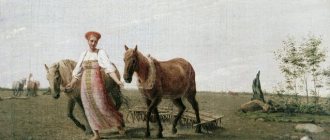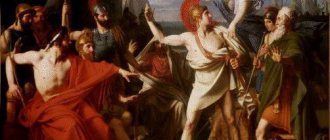| « | I wanted. Help. People! | » |
| — Prometheus in the cartoon by A. Snezhko-Blotskaya | ||
Prometheus
is the protector of people from the tyranny of the gods.
People are weak and gods are not always good, and then someone comes along who wants to help people and make their plight easier, usually by giving them an important thing. Prometheus may be a god rebelling against injustice, or a titan seeking revenge on the gods. This could be a powerful mortal who wishes to share the secret of his power with others. Most likely, he will even be punished for his action.
The codifier of the trope is Prometheus himself from ancient Greek myths, who first taught people how to sacrifice less to Zeus and leave more for themselves, and then generally stole fire and gave it to people.
Unfortunately, in modern presentations of myths this point is missed - Prometheus perceived people not as funny pets, but rather as descendants (his brother Epimetheus is generally the ancestor of all people according to myths, through his marriage to Pandora). According to different versions of myths, it was the titan Prometheus who either created or animated people. During the era of the reign of the Titans, they patronized people in every possible way - it was during those times that the legendary Golden and Silver Ages of Greek mythology occurred. After the defeat of the Titans, the Olympians wanted to exterminate a tribe of people alien to them, and Prometheus managed to save their lives in exchange for sacrifices to the gods. According to the same myths, Prometheus did not bring fire to people, but returned it to them. The Olympians had previously taken the fire from the people in rage at Promethean deception when agreeing on a sacrifice.
Examples about Prometheus itself[edit]
- “The Riddle of Prometheus” by Lajos Mesterházy: why was Prometheus not revered as a god? — “Prometheus was the greatest benefactor of mankind. So why in the ancient world was not a single star named after him (the eagle that pecked his liver deserved this honor!), why is there no temple, not even an altar or a spring, a grove dedicated to his memory? Meanwhile, the huge starry sky is full of sometimes very insignificant characters from mythology and legends, and some stars even got the names of certain household items. […] Prometheus got nothing. Nothing! Or let’s remember something else: of the dozen main gods of Greco-Roman mythology, some are still alive today, not only in heaven, but here on earth, in our everyday life. In a number of languages used by hundreds of millions of people in Europe and America, Monday is the day of the Moon or Diana, Tuesday is Mars, Wednesday is Mercury, Thursday is Jupiter, Friday is Venus. Still! And how many ancient gods live in our proverbs and sayings! (“What is permitted to Jupiter...”, “The figure of Juno,” “Beautiful as Apollo,” and so on) Prometheus? There is no Prometheus. But Prometheus is a god, and older than Zeus.” In fact, Meshterhazy frankly did not know the materiel: the temples of Prometheus existed; Prometheus appears as a noble tyrant fighter only in the tragedies of Aeschylus - in Aristophanes in “The Birds” he is depicted much more ironically; and Meshterhazy has a lot of other mistakes - with the weapon of Hephaestus, and with his family life, and with the Hittite laws, and with the breasts of the Amazons... Lajos also apparently did not know about the radioactive element “promethium”...
The image of Prometheus in the tragedy of Aeschylus “Chained Prometheus”
... The wisdom of numbers, the most important of the sciences, I invented for people the addition of letters, the essence of all arts, the basis of all memory.
I am the first who accustomed animals to the yoke, and to the collar, and to the pack, so that They would save people from the most exhausting Work. And I harnessed the horses, obedient to the lead, The beauty and shine of wealth, into carts, It was none other than me who equipped the Court with linen wings and boldly drove them across the seas. That's how many tricks for earthly people I came up with, ill-fated... Aeschylus “Chained Prometheus” The ancient Greek tragedian Aeschylus in his work reflected a whole stage in the formation of the Athenian state. His tragedies captured many of the events of that heroic time when the Greek people defended their freedom and independence. Therefore, the poet’s works are full of conflicts of powerful passions, and majestic heroes act in them. The tragedy “Chained Prometheus” is precisely such a work, which is based on the ancient myth about the titan Prometheus, who provided invaluable services to people. From the first lines we learn that the formidable ruler Zeus doomed the hero to eternal torment because he dared to go against him, stealing fire and giving it to people. And Zeus came up with a cruel punishment for Prometheus so that he would pay for his guilt before the gods. So that he finally recognizes the primacy of Zeus And so that he swears to boldly love people. The servants of Zeus, rude and unceremonious, do their job with pleasure - they chain the hero and entangle his body with iron chains. But courageous Prometheus utters neither a word nor a murmur. He doesn't ask for pity. And only when left alone does he give vent to his feelings: I see no end to the torment... ... I languish in the yoke of misfortune Because I showed honor to people. However, despite the unbearable suffering that the eagle causes him by pecking out his liver, Prometheus does not submit. To Hermes, sent by Zeus to persuade the hero to reconciliation and submission, and at the same time to find out the secret that he possesses, Prometheus proudly replies: Know well that I would not exchange My sorrows for slavish service. He does not give in to any persuasion or threats and remains adamant: “I will not answer a single question of yours.” The titan retains its determination until the last minute. When the rock with the chained Prometheus falls through the ground, he only appeals to the justice of higher powers: I suffer without guilt - look! Aeschylus calls his hero “philanthropist” - a word that he himself invented and which means: one who loves people, a friend of people. However, his image is incredibly broader and more meaningful than in the ancient myth: he not only gave people fire, but also opened for them all the benefits of civilization. The author, through the mouth of a titan, tells how, having emerged from a primitive state, people increasingly awakened to conscious life and developed their culture. We see the role that Prometheus plays in this, how many discoveries he brings to humanity. It’s as if the entire history of humanity is passing before us, the history of its intellectual and spiritual growth, the development of its material culture. The hero taught people crafts, counting, and determining the seasons; he stood up for them before Zeus, who wanted to destroy humanity. He also turned out to be a skilled doctor and passed on this knowledge, taught people to make medicines, interpret signs, mine gold, iron, copper and other riches hidden underground. Aeschylus created in his work the image of a fighter for truth and justice. He contrasted him with all other characters. Thus, he surpasses Hephaestus in fortitude, Oceanus in uncompromisingness, and Hermes in self-esteem and independence. Loving humanity, Prometheus is irreconcilable to the “tyranny of Zeus.” For him, the king of the gods is the embodiment of cruelty and injustice. Thus, he also acts as a fighter against tyranny, with the absolute power of the Father, capable of any crime. The image of a courageous, fearless, noble and strong-willed titan has been recreated more than once in world culture even after Aeschylus. Prometheus became the hero of Goethe's rebellious poem, the poems of Byron and Schiller, imbued with the spirit of freedom, and the musical works of Liszt and Scriabin. It was also sung by many Russian poets of the 19th-20th centuries.
Examples about similar images[edit]
Cinema[edit]
- "Alien: Covenant": android David. And twice: first he destroys the Engineers who created and once tried to destroy man, and then he destroys the human expedition for the benefit of the race of Aliens
. In both cases, P. Shelley quotes “Ozymandias”[1].
Literature[edit]
- Anatole France, "Rise of the Angels". Almost like a codifier.
- Alexey Pekhov, “Under the Sign of the Manticore”: the brother of the Savior, branded by the Church as the “Tempter,” wanted to present people with a Magical Gift - the ability to perform magic.
- "Prince of Light" by Roger Zelazny: Earth colonists on an alien planet are divided into gods who have access to all the technologies of the future, and ordinary people living in the Middle Ages. Sam, one of the gods, who wants to end such injustice, creates a new religion in which salvation occurs without worshiping the gods. And then he gathered an army and, with the help of his comrades-in-arms, told the gods so much that they significantly moderated their claims.
- Zelazny “Again and Again” is a short story from the perspective of Prometheus-Lucifer. He has never yet won in his attempt to bring progress to humanity - but he will never give up trying.
- Nick Perumov, "Death of the Gods" - Hedin, Rakot and Khroft. More precisely, their altruism is so-so, rather a kind of ideological rebellion. But not without a streak of “tyrant fighting”, yes.
- Prince of Nothing: Kellhus, although he does not oppose the gods themselves - he only absorbed their religions in order to use their followers in the fight against the Consult. But this does not stop the gods from trying to destroy him. Prophet Fan. But only against the Hundred Gods, the one whom Inri Seien called the God of Gods was greatly respected by Fan and considered worthy of worship by the One God.
- You will laugh, but Consult! To the point that Sheonanra directly bears the nickname Shauriatas - Traitor of the Gods. Towards people, however, altruism was very limited - within the framework of 144,000 chosen people and not a single person more!
Video games[edit]
- The Risen series - it all started with the fact that a certain magician threw out all the gods from the world in order to protect people from them...
- Sword of the Stars: The elders of Liir, who achieved biological immortality, became living gods and created Zuul. Black became Prometheus and a tyrant fighter who overthrew their power.
- Dark Souls: Cunning Dwarf Manus
, was the owner of the Great Dark Soul. He tore it into many pieces and turned the unreasonable undead (Hollows) into people, giving them souls. Its fragments are called Humanity and allow you to transition from Hollow to Human form. - Diablo III - with Tyrael wick screwed on.
- Star Wars: Knights of the Old Republic II: The Sith Lords - Kreia. She sought to destroy the Force for the benefit of people, considering it a source of conflict.
- Chrono Trigger - Robo's real name is Prometheus, he was created to spy on people and help destroy them, but ultimately went against his creator to protect humanity.
Visual novels[edit]
- Monster Girl Quest - Angel Prome
Stein. Deconstruction of the image of a noble rebel, educator and fighter against God, who loves people with all his heart.
Board games[edit]
- WarHammer 40000: The Emperor of Mankind, aka Anathem, stole divine power from the Warp Forces for the benefit of the human race.
The plot of the work
The myth is based on the story of how Prometheus stole fire from Zeus, hid it in the reeds that had grown along the Hyrcanian coast since ancient times, and gave it as a gift to people. Prometheus taught people all the sciences and crafts that he himself knew:
- he gave people knowledge, taught them reading, counting, and writing;
- he introduced people to metals, taught them how to extract them from the bowels of the earth and process them;
- he tamed a wild bull and put a yoke on it so that people could cultivate the land;
- he was the first to build a ship and equip it;
- He also introduced people to the first medicines and taught them how to treat diseases.
In other words, Prometheus taught people everything that makes life easier and makes it more joyful and happy. At the same time, he failed to give people laws and teach them how to live a correct social life. He instilled in people “blind hopes”, the ability to hope, to believe, the desire to act, to strive for the fulfillment of a dream, to believe in one’s dream. The beneficial functions of Prometheus and his wisdom create the conditions for a dispute with Zeus, for disobedience and rebellion.
Finished works on a similar topic
Coursework Prometheus chained, brief analysis 420 ₽ Abstract Prometheus chained, brief analysis 230 ₽ Test paper Prometheus chained, brief analysis 250 ₽
Receive completed work or specialist advice on your educational project Find out the cost
Zeus severely punished Prometheus for stealing fire. Wanting to break him, Zeus initially plunged the rebellious titan into Tartarus, into impenetrable darkness, where, according to the ideas of the ancient Greeks, the souls of the dead would roll up, then raised him to the surface of the earth, chaining him to a rock with a diamond wedge driven into Prometheus’s chest. But this was not enough for the vengeful Zeus, and he sent a huge eagle to Prometheus, which flew to the titan every morning in order to torment his liver. By morning the wound healed, and the eagle flew again. Prometheus endured all the tortures in silence.
His mother Themis and father Ialet came to the sufferer and offered to humble himself and submit to his almighty brother, Zeus, but the titan refused. The oceanid nymphs felt pity for Prometheus and begged him to humble himself and reveal the secret to Zeus. Prometheus and his brothers, the Titans, asked for the same thing. But Prometheus refused, saying that he would confess to Zeus only if he admitted that he had dealt with him in vain. Ignorance and misunderstanding of the essence of Prometheus’s act tormented Zeus, and he decided to free Prometheus.
Hercules and the son of Kronos, the centaur Chiron, freed Prometheus. Titan revealed the secret to Zeus, the latter, heeding the warning of the Moirai and Erinyes, gave the nymph Thetis in marriage to King Peleus. In this marriage, Achilles was born - the grandson of Zeus and the future hero of the Trojan War.
Prometheus was forgotten, and Zeus took his place as the ruler of gods and men, the patron of heroes and the giver of all blessings. The people for whom Prometheus made sacrifices remained silent.





